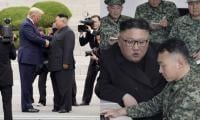Ayodhya, Kartarpur, and Jinnah’s Pakistan
The South Asian hero is seen differently by different communities, but in the aftermath of yet another symbol of India’s institutionalization of Hindu supremacism or Hindutva, one man stands above all others in South Asian history.
A magnificent, progressive political leader, a prescient sage for the ages, and an advocate for his people like no other, Quaid-e-Azam Mohammad Ali Jinnah’s entire politics was about togetherness, conversation and solutions. As India’s Supreme Court judgement on Ayodhya further cements the inevitable decline of that country into Hindu Taliban territory, the responsibility on Pakistanis to deliver Jinnah’s Pakistan is graver and more important than ever before.
The Quaid’s political life was shaped by three eras; the first was defined by his role as The Convenor and Mobiliser, in the second he became The Negotiator and Arbitrator, and in the final phase, he was The General and Governor.
The Convenor and Mobiliser sought agency for a colonized people that would enable greater human dignity to all of them, irrespective of which specific group the colonized belonged to. When Pakistan opens the Kartarpur Corridor against all odds (and against all efforts by India to scuttle it), it is acting out its true destiny, in keeping with Jinnah’s grand vision of humanity and people. Our textbooks have, for generations, inaccurately described this first, pre-1920s era of his politics as his Ambassador for Hindu Muslim Unity phase. But the moniker does not accurately capture the essence of why he was The Convenor and Mobiliser of his people – all his people, regardless of religion.
The driver of Jinnah’s politics prior to the 1920s was agency for the colonized. In the 1920s both Jinnah’s original political home, the Indian National Congress, and the fragmented group that he eventually unified and led to liberty, Indian Muslims, turned to politics of agitation. But as The Convenor and Mobiliser, the Quaid was deeply uncomfortable with Gandhi’s showmanship, and the continued insistence of Muslim leaders to cling to the past. He opposed the Khilafat Movement in 1924, and believed that trying to return to the past was a recipe for failure, not success.
In 1932, when Mohandas Gandhi exposed the Congress as an elitist, Hindu First party by rejecting the Communal Award, Jinnah realized that runaway majoritarianism in the Congress would eventually poison India towards the eventual insanity that was on display in Ayodhya in 1992 (and has been the defining feature of that country ever since). Thus emerged Jinnah The Negotiator and Arbitrator, a leader capable of responding to the environment and evolving. As the greatest lawyer of his generation, he was able to establish a space for a reasoned, principled and highly sophisticated narrative for all his colonized people, whilst simultaneously recognizing the special threat that existed for the colonized Muslims of South Asia.
Through it all, Jinnah maintained a stoic dignity that placed him in a category all his own, and even when South Asia was plunged into heinous, murderous riots. Despite the reams of anti-Jinnah propaganda that has spewed slanted narratives about events like Direct Action Day in 1946, Jinnah’s legacy (relative to any other South Asian leader) as a bridge builder and an advocate for order and stability is unassailable. In every story, big or small, that led to the independence of Pakistan from historical British Raj, and eventual Hindutva Raj, Jinnah’s effort was to try to negotiate, arbitrate and hack away at hatred, division, disorder and instability.
After Pakistan was created, Jinnah knew he had to deal with the fallout of the strategic errors, dishonesty, and malice of both Congress’ Hindu First leadership, and the easily duped men of the British colonial empire that governed the original Brexit from South Asia (friends in the UK will recognize the typology amongst British voters today).
As governor general, he was forced into the role of The Governor and General. Pakistan’s moral superiority in Kashmir required the force of arms to be able to be established as an international dispute – he delivered. Pakistan’s economic fragility required that he maintain open phone lines with the elite within the region, and the United States at the global level – he delivered there too. Most of all, he was required to establish the principles that would allow Pakistanis to pick up his quotes and fight for what he believed in. That’s why you make speeches like the one from August 11, 1947.
Sadly, the Pakistan that was bequeathed to South Asian Muslims in 1947 was never the Quaid’s first, or the most ideal solution to the deep problems that Gandhi, Nehru (or others that were more openly hostile to Indian minorities) helped cement in the region. And Pakistan’s default handicaps since then have been exploited by the less capable, but equally Hindu First politicians of India since then.
Weak and purposeless Pakistanis have only helped Jinnah’s enemies along in these endeavours. There are three grave errors that Pakistani purposelessness and weakness have produced that undermine the destiny of Jinnah’s Pakistan.
The first was the treatment of East Pakistanis, or Bengalis by the state and society at large, including by the Muslim League (and arguably by Quaid-e-Azam himself). The errors in judgement and miscarriages of decency that culminated in the grave injustices of 1971 cannot be reversed, but a process of healing with Bangladesh has never been allowed to take root, despite efforts on both sides at various times. No matter what lies have been propagated in Dhaka since 1971, the onus for reconciliation is on Pakistan, and the option of forgiveness remains with our Bangladeshi sisters and brothers.
The second was the second amendment to the Pakistani constitution. Pakistani politics does not allow for this space to be engaged with, but a systemic, constitutionally-embedded discrimination against one’s citizens is wrong in spirit, and it is wrong in practice. Such a grave contradiction defies Jinnah’s Pakistan.
The third was the Kargil fiasco because it was rooted in one grand domestic strategic failure, and it resulted in two grand international failures. Kargil began the day Jahangir Karamat was fired as COAS – and this was and remains the worst and most egregious moment for civil-military relations in Pakistani history. Kargil also produced two grand failures internationally. First, it enabled the replacement of Pakistan as the United States’ principal ally in South Asia. Though the shift may have been inevitable, Kargil catalyzed it by several years. Second, Kargil oxygenated India’s efforts to insert the word terrorism into the lingua franca used globally to talk about the Kashmir dispute.
The best way to interpret India’s Ayodhya judgement and Pakistan’s Kartarpur Corridor is to be frank and honest about both.
The Ayodhya judgement only reinforces what Jinnah knew about India one hundred years ago. The Kartarpur Corridor reflects what Pakistan could have and should have been all along, in keeping with what and who Quaid-e-Azam was.
Maybe Ayodhya and Kartarpur help expose India for what it really is. But they do not fix the things Pakistan should not be. Now, more than ever before, the march toward Jinnah’s Pakistan must continue, with steely and stoic resolve. Just like the Quaid.
The writer is an analyst and commentator.
-
 Meghan Markle, Prince Harry Believe They Could Help King Charles, William As Royals Face Major Crisis
Meghan Markle, Prince Harry Believe They Could Help King Charles, William As Royals Face Major Crisis -
 Rob Rauscha Steps Away From Reality TV After 'The Traitors' Triumph: 'It's Not A Life I Want'
Rob Rauscha Steps Away From Reality TV After 'The Traitors' Triumph: 'It's Not A Life I Want' -
 Val Chmerkovskiy Shares Message With Fans After Hospitalization: 'Thank God, No Brain Tumour'
Val Chmerkovskiy Shares Message With Fans After Hospitalization: 'Thank God, No Brain Tumour' -
 China Achieves Breakthrough In High-speed Satellite-to-ground Laser Communication
China Achieves Breakthrough In High-speed Satellite-to-ground Laser Communication -
 AI Is Creating Jobs, Not Replacing Them—Here’s Why
AI Is Creating Jobs, Not Replacing Them—Here’s Why -
 Sharon Osbourne Gives Exciting Update On OzzFest
Sharon Osbourne Gives Exciting Update On OzzFest -
 Savannah Guthrie Receives Exciting Update In Mom Nancy Abduction Case
Savannah Guthrie Receives Exciting Update In Mom Nancy Abduction Case -
 Prince Harry Sends Strong Message To William Regarding Princess Eugenie, Beatrice
Prince Harry Sends Strong Message To William Regarding Princess Eugenie, Beatrice -
 Elon Musk: Tesla Set To Lead In AGI And Revolutionary Atom-shaping AI
Elon Musk: Tesla Set To Lead In AGI And Revolutionary Atom-shaping AI -
 Harry Styles Gets Candid About ‘existential’ Crisis As Album Release Nears
Harry Styles Gets Candid About ‘existential’ Crisis As Album Release Nears -
 Another Royal Ex Planning Tell-all As British Royal Family Face Crisis Upon Crisis
Another Royal Ex Planning Tell-all As British Royal Family Face Crisis Upon Crisis -
 Investors Keep Pooling Money To Buy Anthropic Shares Despite Ban
Investors Keep Pooling Money To Buy Anthropic Shares Despite Ban -
 US, Ecuador Launch Joint Military Operation Against Drug Trafficking
US, Ecuador Launch Joint Military Operation Against Drug Trafficking -
 Meta Builds Applied AI Organisation To Improve Model Performance
Meta Builds Applied AI Organisation To Improve Model Performance -
 EV Batteries At Risk: Can Technology Outsmart A Warming Planet?
EV Batteries At Risk: Can Technology Outsmart A Warming Planet? -
 Here’s How Latest AI Documentaries Expose Dark Side Of Technology
Here’s How Latest AI Documentaries Expose Dark Side Of Technology



